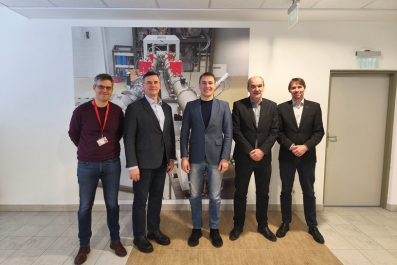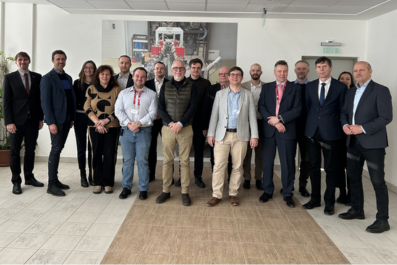STUDY PROGRAMME features and objective
A graduate attains a complete first academic degree education in the field of cybernetics with a predominant focus on application of mechatronic principles in technological devices and systems. He or she possesses integrated and refined knowledge in the fields of mechanics, electronics, operation, and computer science they are able to utilise in innovatory ways in the process of implementation of novel methods and principles when setting patterns of products and modern technological apparatuses as well as in the areas of unprecedented progressive technological processes and technological innovations. They are qualified to effectuate methods and procedures of analysis and synthesis of mechanical and mechatronic systems, theories and application of modern system modelling and automated control methods, information and communication technologies and control systems.
In the process of the study programme, a graduate gains agility and broad interdisciplinary proficiency which allows them to adopt modern software tools for the creation of virtual prototypes and their effective utilisation in the development of new technological appliances and systems and technological processes.
A graduate is capable of carrying out operations in the area of projection and mechatronic system realisation with application in diverse domains concerning the Industry 4.0 elements and the significance of its concepts.
Based on the previously attained knowledge and experience, a graduate is prepared to enter the labour market instantaneously and, following that, perform his or her developmental, applicative, operational, and managerial duties.
This study programme’s graduate is, moreover, qualified to wield the received education, abilities and expertise which enable them to continue the second degree of education in the given or related study programmes.
Attained knowledge base
A graduate of B-MTTZ - Mechatronics in Technological Devices
- is instilled with an up-to-the-minute understanding of natural sciences, especially mathematics and physics, indispensable for further comprehension of principles regarding the design and functional use of mechatronic systems
- uses relevant methodology and principles of constructing technological accoutrements and produces technical documentation in accordance with the results
- interprets his or her acquaintance with manufacturing processes in the sphere of engineering technologies and technological material processing
- presents working knowledge in the field of theoretical and applied mechanics, stress-strain curve, linear elasticity theory and finite elasticity theory, fluid mechanics, thermal physics, hydraulics, electrotechnical engineering and electronics
- puts learnt programming languages into practice when designing algorithms and developing control systems
- implements the fundamental principles and methods of computer-aided modelling of dynamic systems, understands the principles of choice and usage of technological elements in control systems
- comprehends the basis of industrial robots and manipulators and their construction as well as motion structures and drive systems of industrial robots, their sensory equipment, and robot application for industrial purposes
Key learning outcomes
A graduate of B-MTTZ - Mechatronics in Technological Equipment
- when planning the origination of technology-related mechatronic equipment, he or she is qualified enough to exert systematic attitude and, in an ingenious manner, apply their cutting-edge capacities within the subjects of analytical and applied mechanics, stress-strain curve, linear and finite elasticity theories, fluid mechanics, thermal physics, hydraulics, electrotechnical engineering and electronics
- knows how to apply their up-to-date information on the methods of computer simulations of mechanical frameworks, machine components dimensioning, and determine the reliability and durability of technological equipment
- employs information technologies, algorithms and builds programs for system control on a level appropriate to that of a specialist
- skilfully handles CAD/CAM/CAE systems and takes advantage of their features to explicate the construction of parts, perimeters and, with a logical sequence, designs plans and solid models of machine components and products before they are manufactured
- cleverly and independently applies theories, procedures, and tools when building systems of automated control used to command technological and manufacturing processes
- programs PLC and makes use of programming techniques to guide industrial robots and instructs industrial robots through Online and Offline Programming via augmented reality workspaces, teach pendants and simulations
- sensibly utilizes their practical understanding of the principles of physical properties of materials and their quantification by means of measurement
- actively and fluently uses professional terminology in foreign languages
General competencies
A graduate of B-MTTZ - Mechatronics in Technological Equipment
- shows self-reliance not only whilst solving specialised tasks, but also in the planning and coordinating partial activities along with extensive projects
- wields the ability of logical, purposeful, creative, and innovative insights
- appropriately and professionally debates their opinions, suggestions and proposals, stances, and observations
- autonomously reaches decisions and diligently leads a team in addition to taking on the responsibility for the results of the team effort
- shows a myriad of expertise when evaluating ethic, societal, legal, environmental, and other aspects in connection with problems he or she is presented with
- by means of learning and knowledge acquisition, a graduate improves their skills and contributes to one’s own professional, mental, and personal growth
labour market demand and CAREER PROSPECTs
A graduate of B-MTTZ - Mechatronics in Technological Equipment
The University indicates professions the graduates are prepared for at the time of graduation along with a prospective chance of employment.
A graduate with bachelor’s degree of the study programme of Mechatronics in Technological Equipment may seek positions of employment in the field of operation, diagnostics, development, projection, and software prototyping of the most advanced technological equipment and systems of computer control.
Taking into account the theoretical and practical interdisciplinary knowledge base fostered and continually improved upon during the course of the study programme, a graduate wields exceptional professional adaptability and immense range of employment opportunities in the field of engineering and electrotechnical engineering industry with possible specifications, including automotive industry, in the fields of design, operation, quality control and mechatronic system service as well as programming and automation of technological equipment and systems.
A graduate of the study programme is capable of, in an ingenious and independent manner, performs tasks encompassed within the graduate profile appropriate to the achieved bachelor’s degree.
A graduate interprets basic professional terminology wordly-wise both in the Slovak and English languages and communicates, presents, discusses, and defends proposals and solutions with regard to the working team, as well as when in contact with a customer. A graduate has the adequate managerial, economic, legal, ecological and ethic awareness and thus bring it into operation in line with their employment.
The knowledge acquired by a graduate ought to be on a level where they can adapt even in positions that are not directly related to the completed study programme.
After the completion of a degree in question, a graduate creates rather promising preconditions with a future reference for continuing the study on a higher level of university education in the given or in related study programmes.
Professional paths and occupational outlook
A graduate of Mechatronics in Technological Equipment study programme is prepared for a workspace incorporation with a wide range of professional applicability, such as a: construction technician, technological, assembly and operational technician within the bounds of mechanics, robotics, applied microprocessor techniques, electrotechnical engineering, electronics, computer construction and computer operated modern manufacturing technologies, quality control and service technician in the aforementioned areas, as well as a mechatronic systems engineer, FEM specialist, FEM analyst, verification and validation specialist in FEM computing, CAD systems engineer, measurement technician, field service technician, mechanic of electrotechnical units, automation technician, technical control worker, quality assurance manager, systems analyst, application programmer, ICT project manager, software developer, software solution designer, ICT support and test engineer, multimedia designer, business intelligence analyst, quality assurance analyst, process manager, PLC programmer, automation engineer, etc.
Academic supervisor: doc. Ing. Milan Naď, CSc., milan.nad@stuba.sk
Educational consultant: doc. Ing. Milan Naď, CSc., milan.nad@stuba.sk
Ing. Rastislav Ďuriš, PhD., rastislav.duris@stuba.sk


